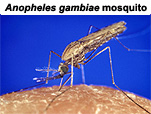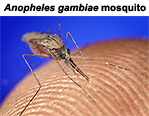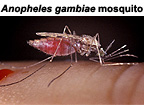 | Mosquitoes Attracted to People with Malaria |
 September 19, 2005
September 19, 2005How do mosquitoes find their way to a meal of blood? Carbon dioxide and lactic acid that we release when we breathe and sweat are two chemicals that attract mosquitoes. Researchers have discovered something else that makes humans more likely to be bitten: malaria! Malaria is a disease caused by a one-celled parasite called Plasmodium falciparum. This parasite lives part of its life cycle in mosquitoes and another part in humans (or another "host" animal). New studies show that mosquitoes prefer people infected with the transmissible form of malaria than people not infected by malaria or those infected with the nontranmissible form of malaria.
Mosquitoes Attracted to Transmissible MalariaMore mosquitoes were attracted to the children with the transmissible form of malaria. Number of mosquitoes caught in traps leading to:
Child with transmissible malaria = 10.2 mosquitoes
The researchers do not know why transmissible malaria makes people more attractive to mosquitoes. They suggest that malaria might change a person's breath or body odor to something especially appealing to mosquitoes. |
MalariaWhat is Malaria?Malaria is a disease caused by a parasite and transmitted by mosquitoes. Once inside a host animal, the parasites make their way through the bloodstream to the liver. In the liver, the parasites multiply and cause liver cells to burst. This results in the release of more parasites into the host animal's bloodstream. The parasites go on to infect and kill red blood cells. A mosquito that bites an infected person consumes parasites along with the blood meal. The disease is transmitted to another person when this infected mosquito the bites another person.SymptomsShaking chills, fever, sweating, nausea, headache, vomiting, diarrhea. If untreated, malaria may cause brain, liver, spleen and kidney damage, respiratory problems and death.TreatmentAntimalarial drugs such as chloroquine, quinine sulfate, hydroxychloroquine sulfadoxine/pyrimethamine (Fansidar), mefloquine, atovaquone/proguanil, doxycycline.PreventionInsecticides, insect repellents, antibiotics. |
| Did you know?
|
|
| References and
more information about malaria:
|
| BACK TO: | Neuroscience in the News | Table of Contents |
![[email]](./gif/menue.gif) Send E-mail |
 Fill out survey |
 Get Newsletter |
 Search Pages |
 Researchers went to an area of Kenya where malaria is a problem. They set
up three tents built around a central chamber. Each tent was connected by
pipes to the central chamber. Inside the central chamber were 100 hungry
(malaria-free) female mosquitoes (Anopheles gambiae). At sunset,
one child (3 to 15 years old) was placed in each tent and the mosquitoes
were released. Some of the children were malaria-free, some had the
transmissible form of the malaria parasite and some had the
nontransmissible form of malaria. The number of mosquitoes that were
attracted to each tent was counted after 30 minutes. The researchers also
tested the same children two weeks after they were given medicine to treat
malaria. (The mosquitoes could not bite a child because a trap stopped
the mosquitoes from reaching the child inside the tent.)
Researchers went to an area of Kenya where malaria is a problem. They set
up three tents built around a central chamber. Each tent was connected by
pipes to the central chamber. Inside the central chamber were 100 hungry
(malaria-free) female mosquitoes (Anopheles gambiae). At sunset,
one child (3 to 15 years old) was placed in each tent and the mosquitoes
were released. Some of the children were malaria-free, some had the
transmissible form of the malaria parasite and some had the
nontransmissible form of malaria. The number of mosquitoes that were
attracted to each tent was counted after 30 minutes. The researchers also
tested the same children two weeks after they were given medicine to treat
malaria. (The mosquitoes could not bite a child because a trap stopped
the mosquitoes from reaching the child inside the tent.) After the children were given medicine to treat malaria, the numbers of
mosquitoes attracted to the different traps were similar.
After the children were given medicine to treat malaria, the numbers of
mosquitoes attracted to the different traps were similar.